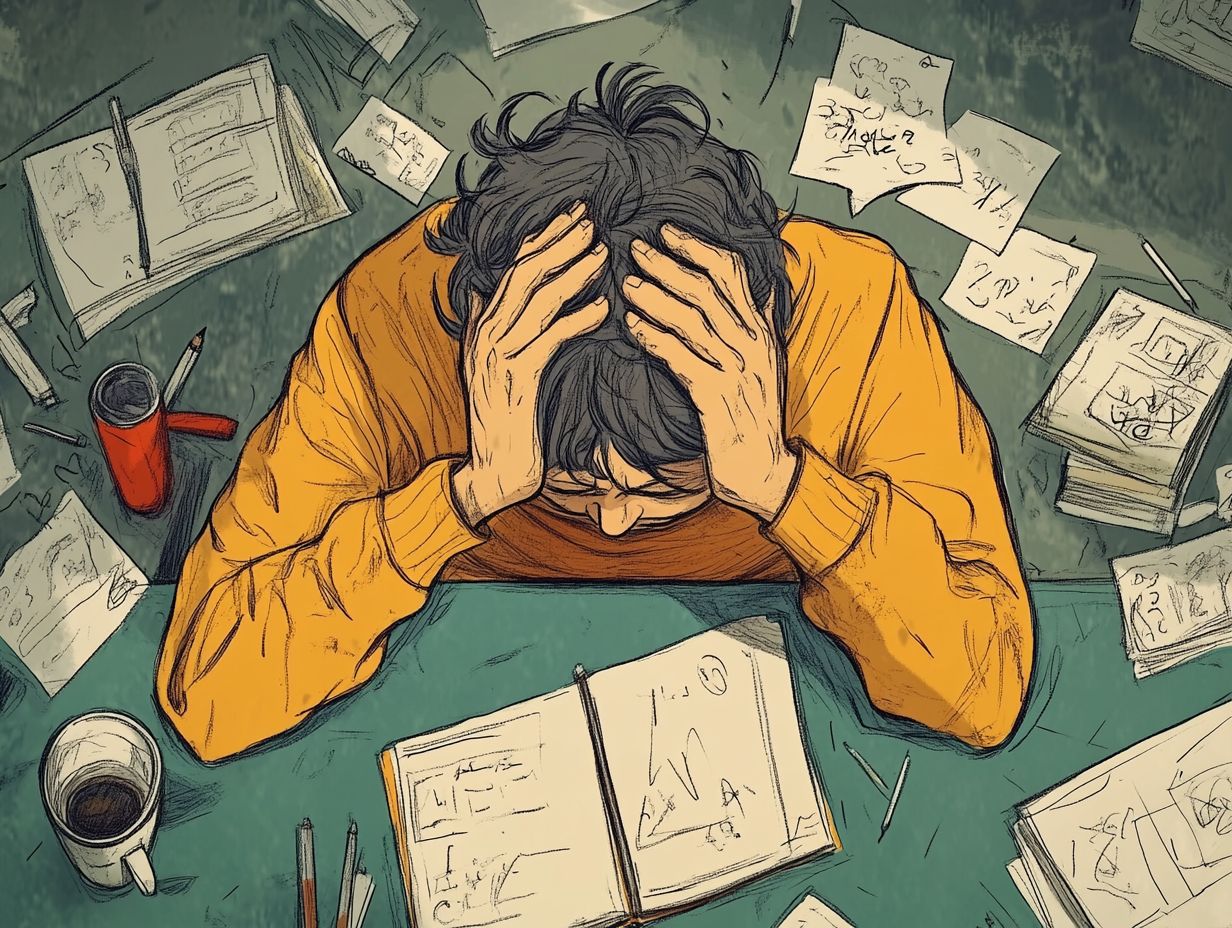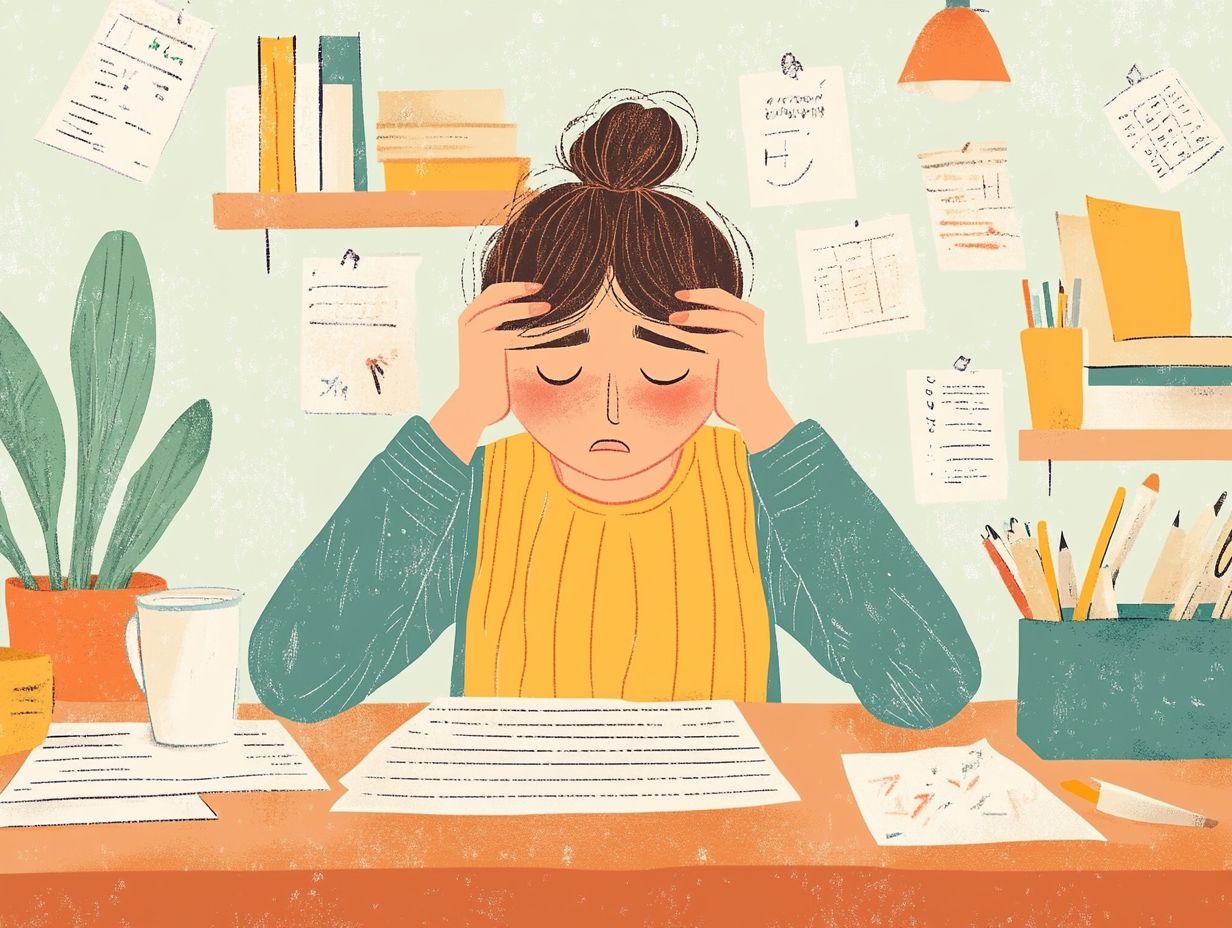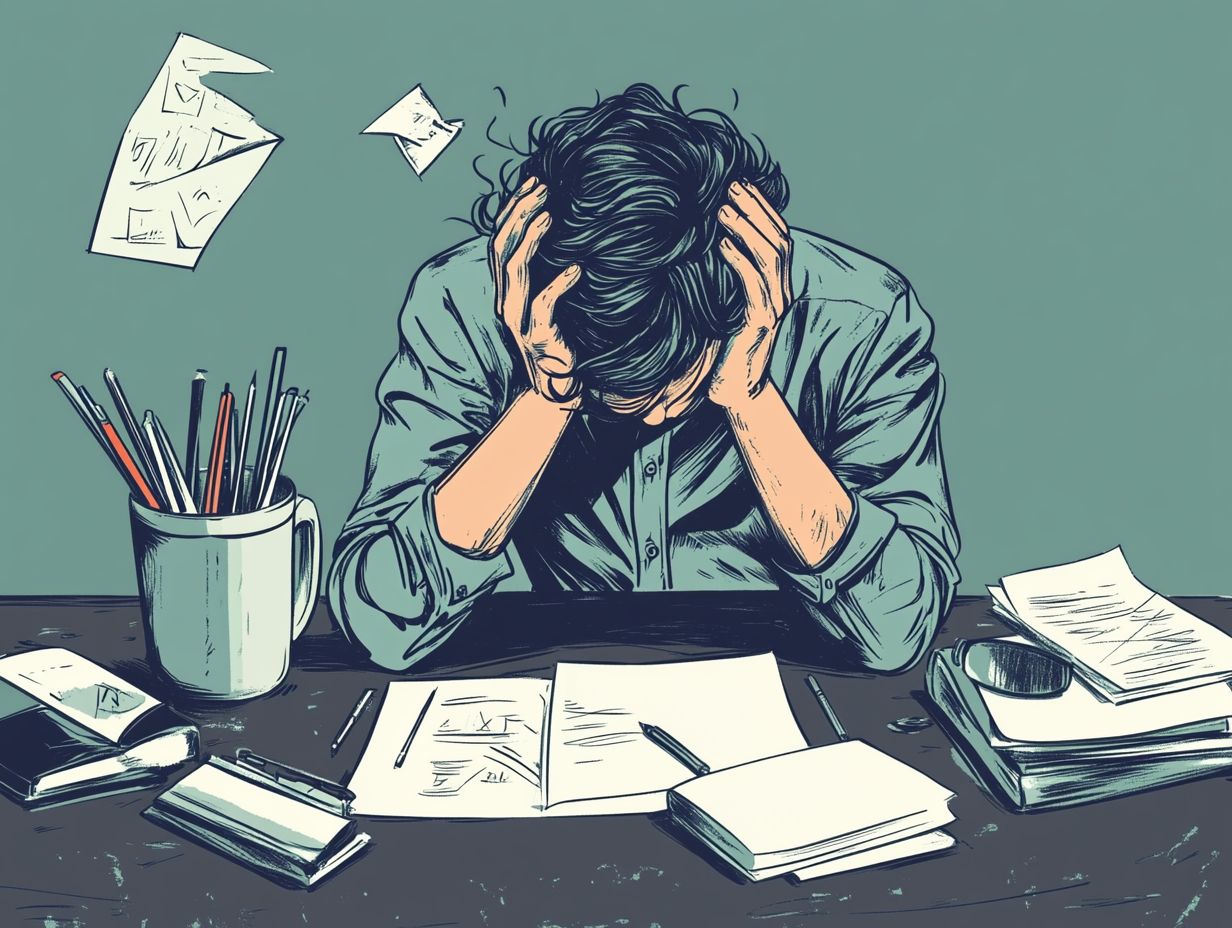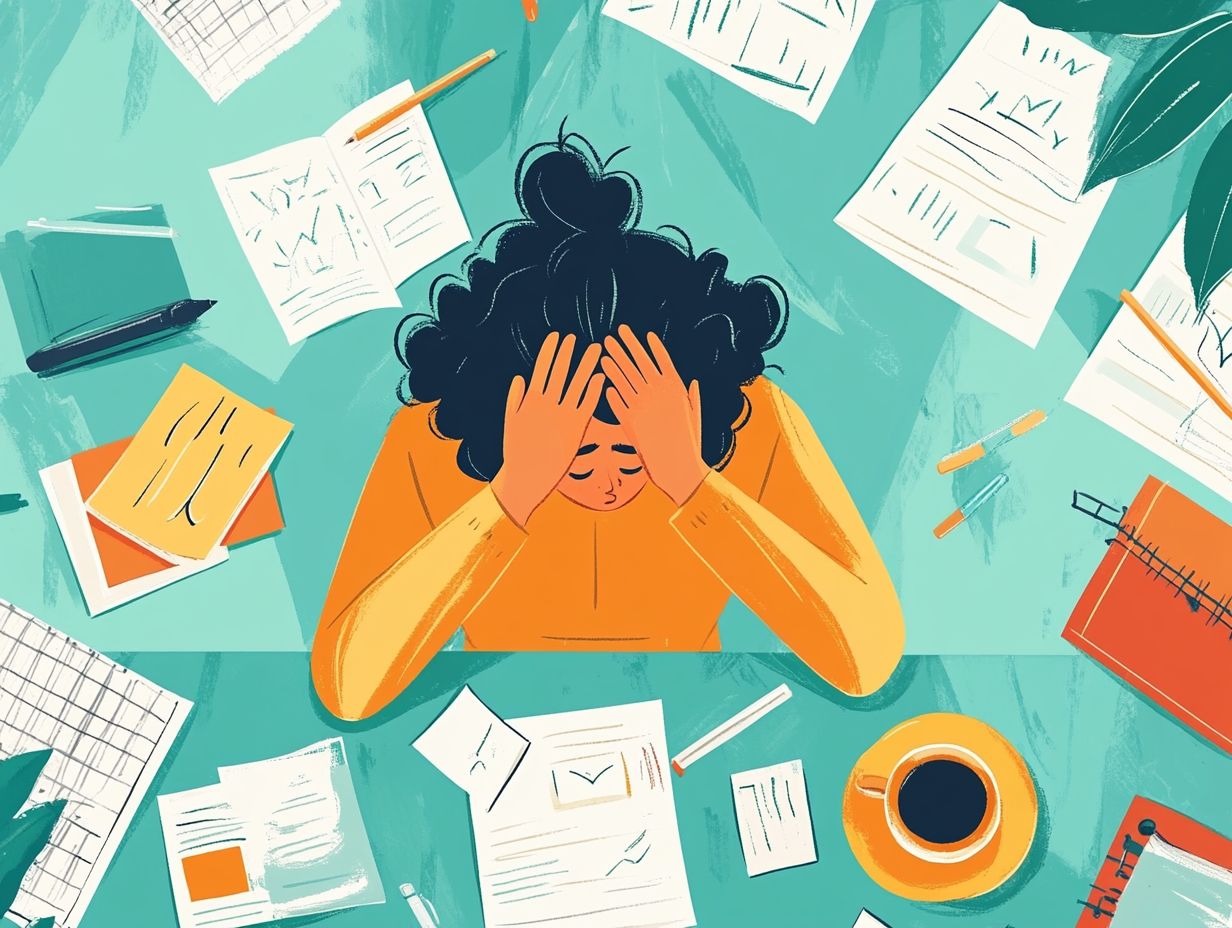Procrastination & Anxiety: Understanding the Link
Procrastination and anxiety often form a challenging cycle that can feel difficult to escape.
This article delves into the complex relationship between these two issues, beginning with clear definitions before unpacking the underlying causes, which are rooted in both environmental and psychological factors.
It examines the impact on mental health, shedding light on common symptoms and effects. It also covers when to consider seeking professional help.
If you’ve ever found yourself overwhelmed by tasks or anxiety, this guide is designed to provide you with valuable insights and support.
Contents
- Key Takeaways:
- The Relationship Between Procrastination and Anxiety
- Causes of Procrastination and Anxiety
- The Impact of Procrastination and Anxiety on Mental Health
- Breaking the Cycle: Strategies for Managing Procrastination and Anxiety
- Seeking Professional Help
- Frequently Asked Questions
- Curious about why procrastination and anxiety often go hand in hand? Let s dive in!
- How does procrastination worsen anxiety?
- Can procrastination be a symptom of anxiety?
- How can understanding the link between procrastination and anxiety help me?
- What are some tips for managing procrastination and anxiety?
- Is it possible to overcome procrastination and anxiety?
Key Takeaways:

- Procrastination and anxiety often go hand in hand, with one fueling the other in a vicious cycle.
- Environmental and psychological factors can contribute to both procrastination and anxiety, making it important to address both simultaneously.
- Break the cycle of procrastination and anxiety for a brighter, more productive future!
The Relationship Between Procrastination and Anxiety
The complex relationship between procrastination and anxiety is a critical topic in mental health discussions. You may find that procrastination often stems from deeper fears, such as a fear of failure or the pressure of perfectionism, making it essential to explore the connection between procrastination and stress.
This dynamic can create a cycle where managing your emotions becomes increasingly difficult. Ultimately, this affects your mental well-being and productivity.
Defining Procrastination and Anxiety
Procrastination is the act of putting off tasks, frequently spiraling into a cycle of delay. Understanding the connection between mindset and procrastination can shed light on this behavior. Anxiety, on the other hand, emerges as a psychological response, marked by excessive worry and fear, especially concerning task completion.
This intriguing psychological phenomenon presents itself in two distinct forms: active procrastination, where you intentionally postpone tasks yet still manage to meet deadlines, and passive procrastination, which comes from putting off tasks because you feel scared or unsure.
This avoidance can significantly heighten your anxiety levels, as unresolved tasks linger in your mind, amplifying worries about looming deadlines. To break free from this cycle, it’s important to explore the link between boredom and procrastination. The interplay between procrastination and anxiety creates a persistent cycle, ensnaring you in a state of avoidance that can feel nearly impossible to escape.
Causes of Procrastination and Anxiety
The roots of procrastination and anxiety are intricate, stemming from a blend of psychological factors, including perfectionism and a deep-seated fear of failure. To gain deeper insights, consider exploring procrastination and its emotional toll. Environmental influences also play a significant role, often obstructing your ability to make effective decisions.
Understanding this complexity is essential for overcoming these challenges.
Environmental and Psychological Factors

Environmental and psychological factors play a significant role in shaping your experiences with procrastination and anxiety. Understanding the link between procrastination and time management can help you address these issues. Psychological trauma can leave you feeling overwhelmed, stripping away your sense of control over your tasks.
This loss of control often spirals into a vicious cycle, where you find yourself postponing essential actions due to fear and indecision.
As anxiety mounts, it can intensify your apprehension, leading you to shy away from challenges entirely. In these situations, the combination of emotional stress and perceived helplessness creates barriers to your motivation, making it increasingly difficult to start or finish important tasks.
Understanding this dynamic is vital, especially if you re dealing with trauma and feeling trapped in these patterns. It may seem like regaining autonomy over your choices and progress is out of reach, but recognizing these influences is the first step toward developing more constructive coping strategies.
The Impact of Procrastination and Anxiety on Mental Health
Procrastination and anxiety significantly influence your mental health, often spiraling into a cycle of negative self-talk and challenges with emotional regulation. Understanding the role of fear in procrastination can help break this cycle.
These patterns can profoundly affect your overall well-being, making it essential to address them head-on for a healthier mindset.
Take the first step today towards overcoming procrastination and anxiety. You ve got this!
Common Symptoms and Effects
Common symptoms of procrastination and anxiety include persistent emotional stress, difficulty in completing tasks, and a reliance on coping mechanisms that may prove ineffective.
These challenges often manifest as overwhelming feelings of dread or helplessness when confronted with responsibilities. This creates a cycle that can drain motivation and impede progress. You may find yourself frequently distracted, leading to a diminished ability to concentrate and an ever-growing list of unfinished tasks.
Emotional stress can escalate, affecting your overall well-being, relationships, and self-esteem.
To break this cycle, effective coping mechanisms such as mindfulness practices or careful planning of your time are essential. By recognizing the signs of procrastination and implementing appropriate strategies, you can significantly enhance both your productivity and mental health.
Breaking the Cycle: Strategies for Managing Procrastination and Anxiety
To overcome procrastination and anxiety, you need a bold and effective plan! Embrace strategies like careful planning of your time, mindfulness techniques, and robust coping mechanisms that enhance your emotional regulation.
This combination elevates your productivity and nurtures your overall well-being.
Practical Tips and Techniques

Utilizing practical tips and techniques can greatly alleviate procrastination and anxiety. Productivity apps and relaxation techniques are effective tools for enhancing your focus and self-compassion.
By integrating structured approaches, such as setting specific goals with the help of productivity apps, you can create a clear roadmap for navigating your tasks. These apps help you stay organized and also remind you of deadlines, which can be incredibly motivating.
Incorporating relaxation techniques like deep breathing or mindfulness can help manage your anxiety, allowing you to concentrate better on the tasks at hand.
Practicing self-compassion by acknowledging your feelings without judgment fosters a healthier mindset. This is essential for overcoming procrastination. Together, these strategies nurture a more productive and balanced life for you.
Seeking Professional Help
Turning to professional help can be crucial in tackling procrastination and anxiety. Cognitive Behavioral Therapy is a method that helps change unhelpful thinking patterns and emerges as a popular and effective choice, often paving the way for positive therapeutic outcomes.
Engaging with a skilled therapist can provide you with the strategies and insights needed to navigate these challenges effectively.
Therapy Options and Resources
You have access to a range of effective therapy options and resources to combat procrastination and anxiety, including mindfulness apps that offer invaluable feedback and support.
These apps are not just gimmicks; they re powerful tools that help you cultivate awareness and foster a sense of calm, significantly enhancing your ability to tackle tasks with efficiency. With features like guided meditations and progress tracking, they enable you to develop a more structured approach to your daily responsibilities.
By integrating cognitive-behavioral techniques with mindfulness practices, you can identify and reframe those pesky negative thought patterns. This combined strategy not only helps reduce anxiety but also builds resilience against procrastination.
With consistent use, these resources will encourage sustainable habits and promote long-term growth in your ability to manage both procrastination and anxiety effectively.
Frequently Asked Questions
Curious about why procrastination and anxiety often go hand in hand? Let s dive in!

Procrastination and anxiety have a strong connection. Anxiety can often lead to avoidance behaviors, causing individuals who struggle with it to put off tasks and responsibilities. This cycle can be better understood through resources like understanding the link between procrastination and motivation, which highlights how this pattern increases stress and anxiety.
How does procrastination worsen anxiety?
Procrastination can create a cycle of stress and anxiety. Delaying tasks often leads to guilt and worry, raising your overall anxiety. To break this cycle, it’s helpful to explore the psychology behind procrastination and understand its roots.
Can procrastination be a symptom of anxiety?
Yes, procrastination can indicate anxiety issues. Putting off responsibilities may help you cope with overwhelming feelings of fear, and understanding the connection between procrastination and perfectionism can offer valuable insights into this behavior.
How can understanding the link between procrastination and anxiety help me?
Recognizing the link between fear and procrastination helps you break the cycle. Understanding why you procrastinate lets you manage your anxiety better.
What are some tips for managing procrastination and anxiety?
Try practicing mindfulness and relaxation techniques. Break tasks into smaller steps and seek support from a therapist if needed.
Is it possible to overcome procrastination and anxiety?
Yes! With awareness and support, you can break the procrastination-anxiety cycle. By addressing your anxiety and developing healthy habits, you can lead a more productive life.






